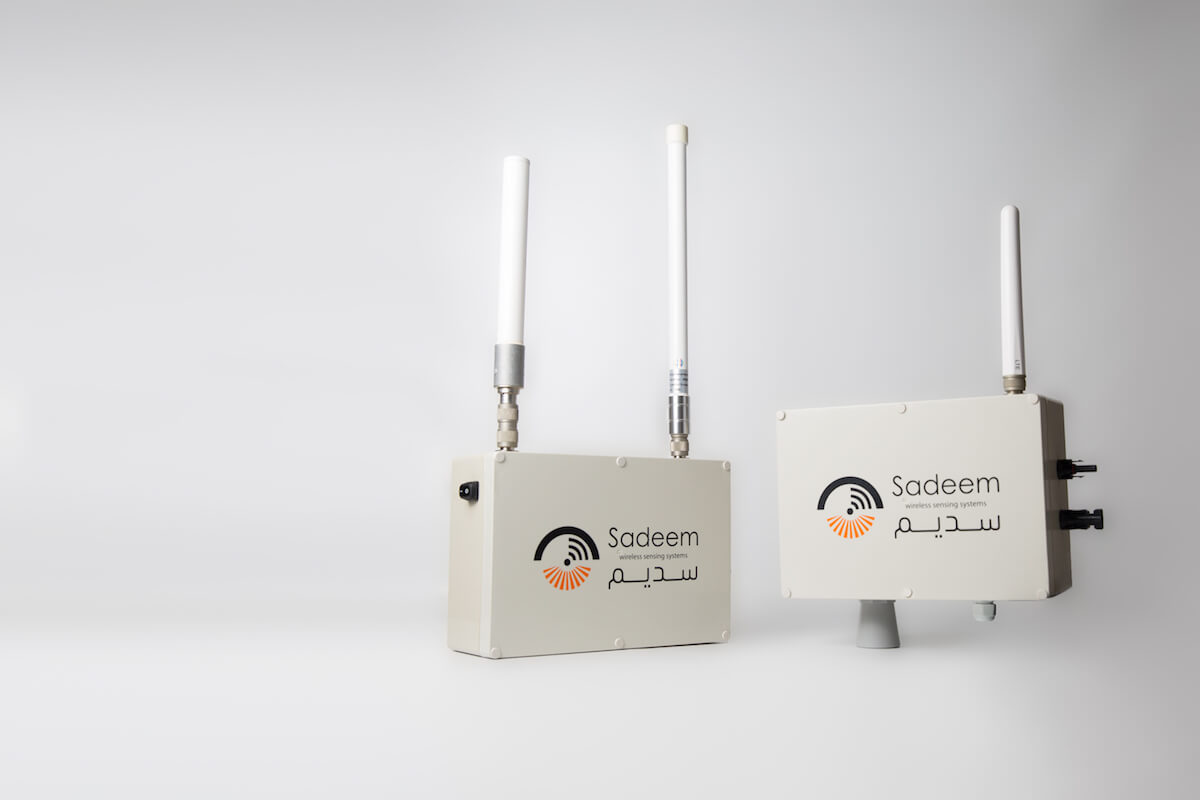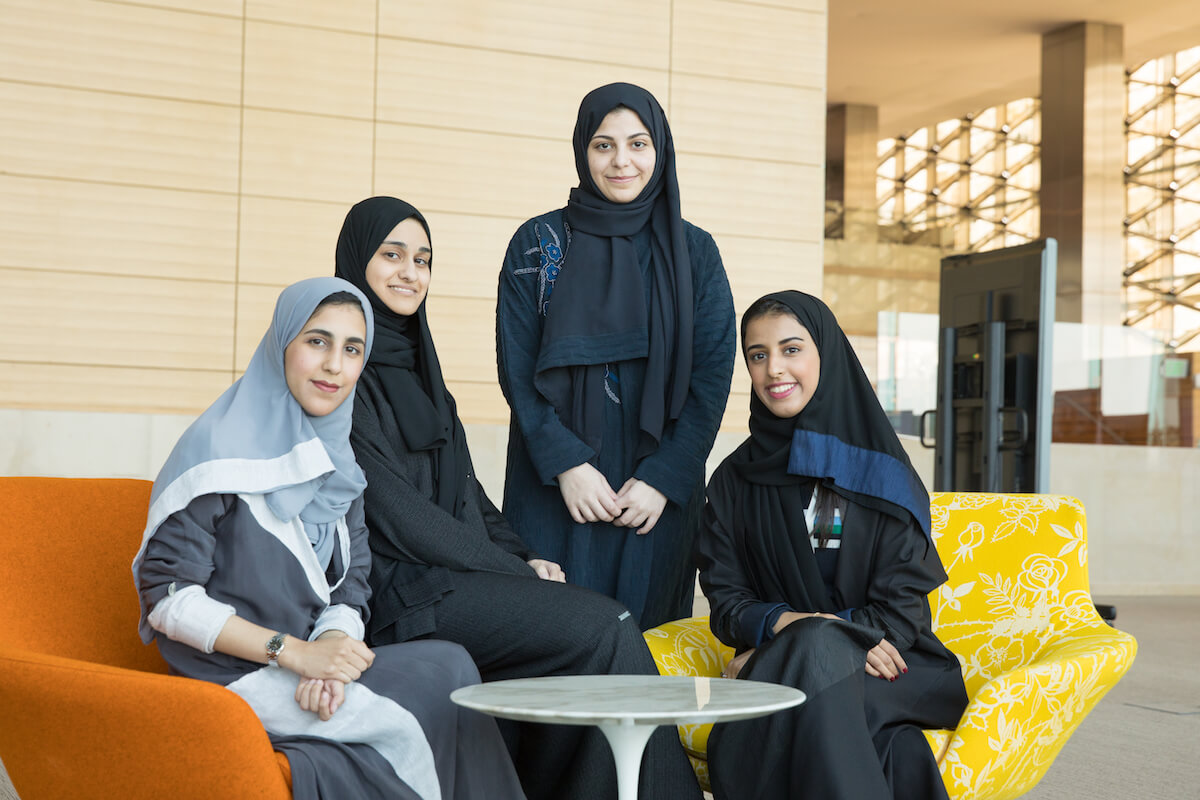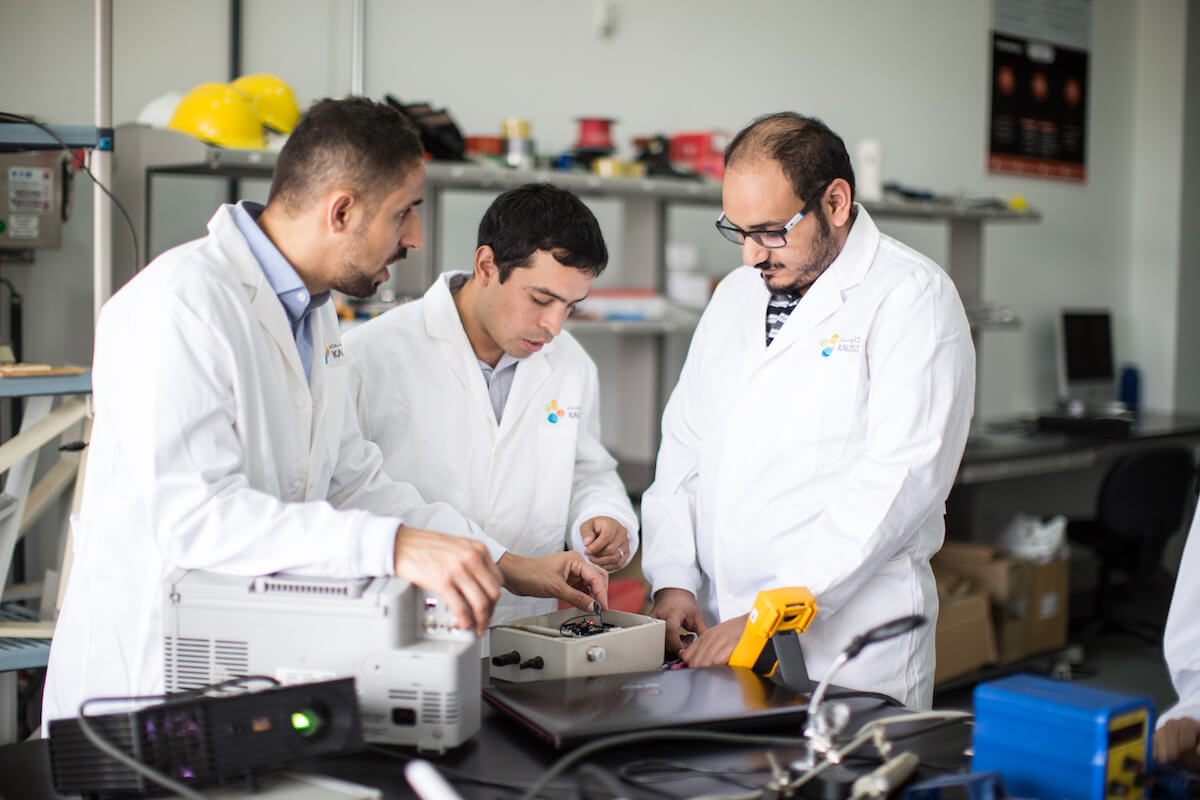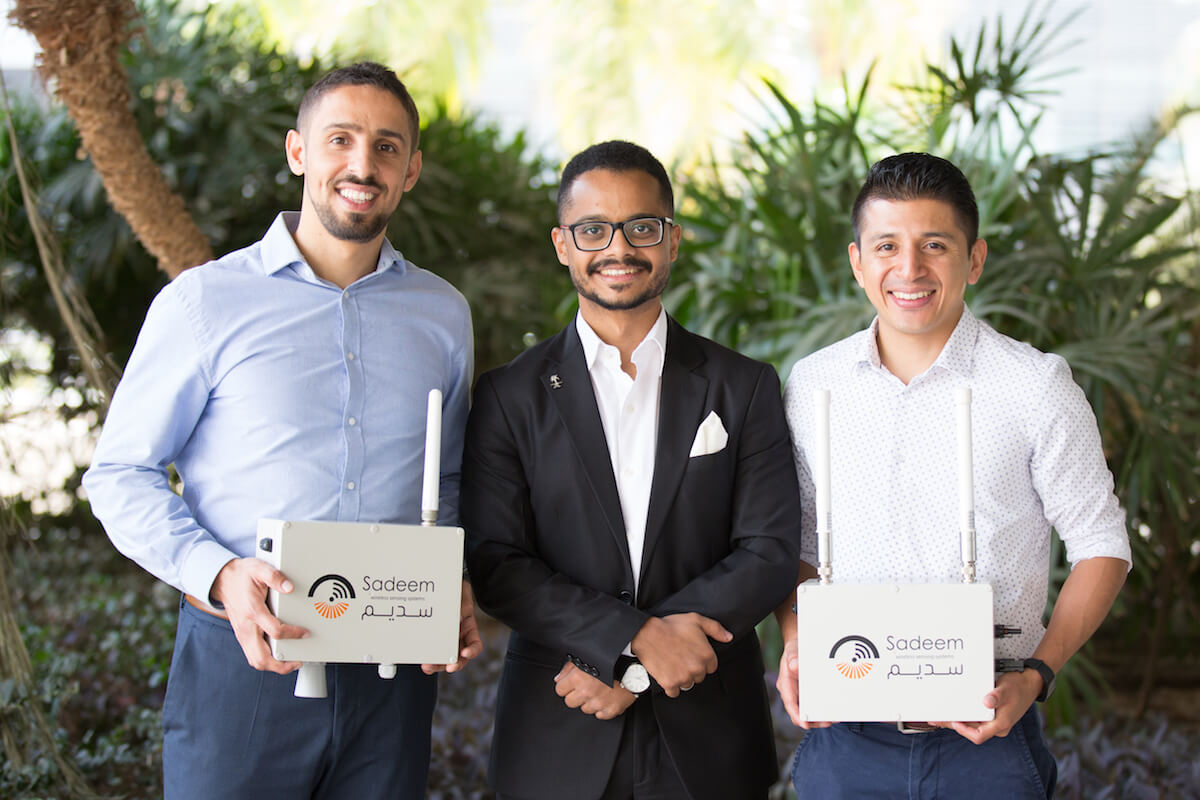Going global with Sadeem
.jpeg?sfvrsn=d0e451cd_1)
The growing team from KAUST startup Sadeem deploys their smart city sensors (pictured, center) for flood, traffic and environmental monitoring in locations around the globe. Photo by Khulud Muath.
By Caitlin Clark, KAUST News
In 2017, we covered the journey of KAUST startup Sadeem—a company that provides solar-powered smart city solutions for flood, traffic and environmental monitoring, saving money and lives in real-time—from its inception. Read about the company's achievements—and expansion—as the startup's story continues below.
An international spotlight focused on Sadeem and its four co-founders, KAUST Ph.D. graduates Mustafa Mousa, Ahmad Dehwah and Esteban Canepa and former KAUST Professor Christian Claudel, in late 2017. The company had just won the Best Global Startup award in Dubai, UAE, at the 37th Gulf Information Technology Exhibition (GITEX) Technology Week.
"This was bulletproof evidence that Sadeem held promise—and not just on a local basis," Dehwah said.
"After GITEX, we said to ourselves, 'Let's make Sadeem something real in every single sense of the word,'" added Canepa.

Sadeem co-founders Esteban Canepa (left) and Mustafa Mousa (right) represented the startup and won the Best Global Startup award at the 37th Gulf Information Technology Exhibition Technology Week in late 2017. Image courtesy of Sadeem.
"We started by focusing on getting the company into shape—having employees, a business model and finance and other systems needed for the operation of a company," Dehwah explained. "Regardless of the size of a company, there are certain basics it has to have. We worked to make sure Sadeem's 'backbone' was ready to accommodate potential expansion, attract talented new hires and create an international profile."

The Sadeem team works in their lab on the KAUST campus. Photo by Khulud Muath.
A digital city
Madinah is Sadeem's most ambitious project to date. As the second holiest city in Islam after Makkah, it receives millions of pilgrims to its holy sites each year.

Startup Sadeem recently installed its smart city sensors in the Saudi city of Madinah (pictured here). Madinah receives millions of pilgrims to its holy sites every year. Image courtesy of Shutterstock.
During the project, Madinah's Development Authority specifically requested Sadeem's air quality and environmental monitoring sensor, called the Aura. It was in the pipeline but not quite ready, but the team delivered the Aura on a time-constrained basis, receiving excellent feedback from the Development Authority for the entire project.

Sadeem's sensors—the Aura for air quality and environmental monitoring (left) and the Equa for flood and traffic monitoring (right)—are pictured here. Photo by Khulud Muath.
The success of the project has brought in other leads from Madinah and also from other cities' development authorities.
Building solutions
"We start a project in a city—like planting a seed—and expand it and customize it to what the city needs," Mousa said. "A highlight has been building on the success of our Equa sensor for floods and traffic and then adding the Aura sensor to this solution. We aim to improve and enhance both while expanding our network."

The Sadeem team employs a wide variety of tools to bring the company's sensors to fruition in the lab. Photo by Khulud Muath.
"These two projects were also planting seeds to start engaging with governments," explained Canepa. "In some areas, the technology is more easily adopted, depending on the city's culture and other factors. But, through each project we gain experience, allowing for more ambitious projects with expanded solutions in the future."
"We see ourselves as engaging in a continuous development process for state-of-the-art monitoring solutions, creating a 'global solution' for everybody," Dehwah said. "Our customers co-evolve with us and with our solutions."

The city of Taif—where Sadeem recently installed sensors—is located in southwestern Saudi Arabia. Image courtesy of Shutterstock.
"Because our systems are plug-and-play, cutting-edge and convenient and we don't use any of the city's infrastructure with them, they can be installed quickly and easily," explained Dehwah. "And, they can engage with any other solution with no extra cost."

Sadeem's sensors are solar-powered to maximize their 'plug-and-play' convenience for cities. Pictured here is the company's Equa sensor and its solar panel. Photo by Khulud Muath.
Growing the Sadeem 'family'
In 2018, the startup hit another milestone, hiring its first employee, Ahmed Al-Hadi, who had just completed his bachelor's degree in computer engineering at King Fahd University of Petroleum & Minerals. The company soon expanded to 10 full-time employees from six different countries—including 40 percent female employees.

Sadeem is proud of its multicultural team members, and the company also includes 40 percent female employees. Photo by Khulud Muath.
"One of our greatest successes so far is our team," continued Dehwah. "They've been pushing our technologies hard to reach the highest levels."

Ahmed Al-Hadi (right), Sadeem's first hire, works in the company's lab with co-founder Ahmad Dehwah (left). Photo by Khulud Muath.
"We want a team that can be as good as—or even better—than we are," said Mousa. "We want people who can be creators and innovators and not just do what they're told. It's been challenging for us to find these people because they've had to begin the company from scratch—all our new departments have started with them."

Sadeem's female employees find the startup an excellent and engaging environment in which to work. (Pictured from left to right): former employee Njood Alzahrani and current employees Somayah Shafaamri, Lubna Al Hajsalem and Alyaa Al Jabri. Photo by Khulud Muath.

(Pictured from left to right): Sadeem's co-founders Ahmad Dehwah, Esteban Canepa and Mustafa Mousa also received their Ph.D.s from the University in 2016. Photo by Khulud Muath.
Opportunities for young entrepreneurs
Somayah Shafaamri, software architect at Sadeem, always wanted to work in a startup. Working for the company is her first job after graduating from Effat University in 2017 with a degree in electrical and computer engineering.
"It's a great experience," she said. "You discover yourself and learn which path you'd like to take in the future. You make a lot of decisions independently and you learn. I've already helped in releasing a new version of the Equa sensor, and I designed some of its new features—this was a wonderful moment for me."

Alyaa Al Jabri (left), Sadeem's software developer, noted the startup's diverse team members 'have great respect for each other.' Photo by Khulud Muath.
"In a startup, as the startup grows, you also grow," added Lubna Al Hajsalem, Sadeem's business analyst. Al Hajsalem received her degree in banking and finance from Dar Al-Hekma University in 2018. "It's easier here to move ahead in your career compared to in a larger organization, and you also know you're helping to save lives and the environment."
"We are all making Sadeem grow into a bigger and better company, and this makes us better employees," original hire Ahmed Al-Hadi said.

Sadeem team members use their talents to 'make cities more resilient and help face the planet's challenges,' stated co-founder Esteban Canepa. Photo by Khulud Muath.
Alyaa Al Jabri, software developer at Sadeem, who graduated from Effat University with a degree in computer science in 2017, noted the diversity of nationalities at the startup appeals to her.
"You learn a lot by dealing with different nationalities," she said. "We have great respect for each other—and we've all improved our communication skills."
Marlon Diaz, Sadeem's hardware specialist and a KAUST master's degree graduate in mechanical engineering ('12), added, "The close environment of Sadeem is nice—it's really a small family. When you start something new, you really feel the impact of what you're doing, and that also makes a positive impact on the company and your co-workers."

Marlon Diaz (center), Sadeem's hardware specialist, works in the company's lab on a sensor with co-founder Ahmad Dehwah (left) and original hire Ahmed Al-Hadi (right). Photo by Khulud Muath.
"It can be challenging at a startup due to the level of responsibility each person has," Al-Hadi said. "When there's an issue, you have to fix it yourself, but that challenge is a good experience."
Diaz was part of Sadeem's project deployment in Madinah, and noted, "It was amazing to be part of the milestone of building a project in Madinah—a really important city—and knowing Sadeem is part of that—in terms of the Kingdom and for the Muslim community. Together, we're making Sadeem better and more impactful for the Kingdom and for Vision 2030 as well."

Sadeem team member Marlon Diaz uses his technical skills to modify a sensor in the startup's KAUST-based lab. Photo by Khulud Muath.
New solutions for a bright future
As the Sadeem team members look to the future for their sensors and projects, they continue to focus on the unique nature of each city in which they work.

(Pictured from left to right): Sadeem co-founders and KAUST Ph.D. graduates Ahmad Dehwah, Mustafa Mousa and Esteban Canepa showcase the company's Equa and Aura sensor technology. Photo by Khulud Muath.
"Cities are like living organisms, and each one has different problems," stated Canepa. "I believe as we move forward, we will start building a portfolio of solutions. These have to be novel in different ways with the same level of flexibility and non-invasiveness for a city. We aim to carry out commercial projects with cities while also building products for them."
"We've taken a research project from the labs of KAUST and built it into a Saudi startup," Mousa added. "From this project, we can now deliver services to government entities that solve key urban planning challenges. We want to keep the Sadeem family growing and spread the company's voice—not only locally or in the Middle East but globally."

